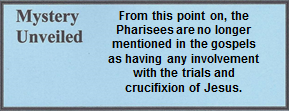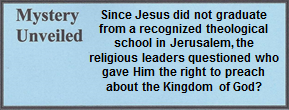13.03.02 Mk. 11:27-33 (See also Mt. 21:23-27; Lk. 20:1-8) In the Temple
THE AUTHORITY OF JESUS QUESTIONED
27 They came again to Jerusalem. As He was walking in the temple complex, the chief priests, the scribes, and the elders came 28 and asked Him, “By what authority are You doing these things? Who gave You this authority to do these things?”
29 Jesus said to them, “I will ask you one question; then answer Me, and I will tell you by what authority I am doing these things. 30 Was John’s baptism from heaven or from men? Answer Me.”
31 They began to argue among themselves: “If we say, ‘From heaven,’ He will say, ‘Then why didn’t you believe him?’ 32 But if we say, ‘From men’”— they were afraid of the crowd, because everyone thought that John was a genuine prophet. 33 So they answered Jesus, “We don’t know.”
And Jesus said to them, “Neither will I tell you by what authority I do these things.”
Jesus returned to the temple where He was confronted by His adversaries. They again attempted to embarrass Him before the massive populace to find accusations to use against Him. This time they questioned the source of His authority.
“The chief priests, the scribes, and the elders came.” The instigators of the death of Jesus were known as the proverbial “unholy trinity” – the Sadducees, scribes, and the elders – all three groups that comprised the Sanhedrin. Notice that the Pharisees are not mentioned because they are absent from the biblical text from this point on and are presumed by scholars not to be involved.

“By what authority.” It is interesting that the leaders questioned His authority, especially in light of the fact that they failed to find anything He did wrong according to the Written Scripture. They had asked the same question of John the Baptist (Jn. 1:19-25) and of Jesus earlier in His ministry (Jn. 2:18-22). The “authority” they were speaking of could come only from the temple priesthood. In essence, their question was: Who had given Jesus the right to teach on the Kingdom of God? Was He an impostor or a temple teacher? The questions by the religious leaders had no reflection upon proper credentials as a rabbi, since that office would not be in existence for at least another century. At this time Jesus was called “rabbi” out of honor and respect, not as a teaching title.

In the Hebraic idioms there were two possible phrases that would give the religious leaders what they wanted. If Jesus claimed authority of either:
- Being the Messiah + the son of David = that was treason and rebellion
- Being the Messiah + the Son of God = that was blasphemy[1]
“Was John’s baptism from heaven or from men?” In typical rabbinic style, He answered the question with another question. They carefully contemplated the answers and the consequence of each answer, because they were masters of theological debate. However, they could not make any comment because, whatever they said, would have reflected negatively upon them. Therefore, they responded, “We don’t know.” However, they did know. They were fearful to say that the baptism was human and equally afraid to say it divine.
The phrase “was it from heaven…?” means “was it from God?” The Jews, throughout history, have substituted words and phrases in place of the Divine Name, as not to abuse it (Ex. 20:7). For this reason, Jesus did not directly say His authority was from God, but He certainly implied it. John the Baptist did likewise. As to the question, the leading Pharisees chose not to answer it.
The counter response by Jesus, “neither will I tell you,” was hardly a failure to answer the question. This was typical rabbinic dialog – to respond in like manner. In essence Jesus said, “Since you won’t answer my question, I will not answer yours.” By their silence they said, “You win,” a non-verbal confession that angered them all the more.
The message was clearly communicated. Everyone understood that John the Baptist was a prophet and that his authority was divine. Likewise, Jesus was a prophet, whose authority was also of divine origin. The fact that neither John nor Jesus were educated in a school of a leading rabbi totally frustrated them. To add insult to injury, both had become more popular among the masses than had any of their leaders. Jesus then continued the conversation to teach those truths concerning the kingdom with the use of four parables recorded in Matthew 21:28 – 22:14.[2]
- The Parable of the Two Sons (Mt. 21:28-32),
- The Parable of the Only Son (also known as the Parable of the Wicked Tenants) Mt. 21:33-41; Mk. 12:1-9; Lk. 20:9-16), and
- The Stone that the Builders Rejected.
- Parable of the Wedding Banquet (Mt. 22:1-14).
Unfortunately, throughout history some theologians have said that these parables suggest that God has replaced Judaism with the church in His eschatological plan. This misinterpretation has given foundation to what has become known as “Christian anti-Semitism.” (A better phrase would be “church-sponsored anti-Semitism” since true Christianity cannot be connected with the hatred of any kind, especially anti-Semitism.) Those who espouse this replacement theology often indicate that these three parables build up to a crescendo in declaring God’s decision to permanently turn away from the Jews.
Notice that the key theme of every parable is in some way focused on Jesus and clarifies a point He is teaching.[3] The objective is to have mankind be transformed into the image of Christ with practical true to life lessons and examples. Unfortunately, some early Gentile church fathers considered these parables allegorical. This was a grave mistake, because parables in rabbinic writings are almost never allegorical. The resulting interpretations are both misrepresented and inaccurate.[4]
After the first test questioning Jesus’ authority, He told four parables:
[1]. At this point, the term “Messiah” and “Son” with a capital letter did not mean deity to the Jewish audience. Understanding Jesus as Deity did not fully occur until after the resurrection and ascension.
[2]. See commentary on Mt. 21:18-19; Mk. 11:12-14.
[3]. Young, Jesus and His Jewish Parables. 5-7.
[4]. Young, Jesus and His Jewish Parables. 103.